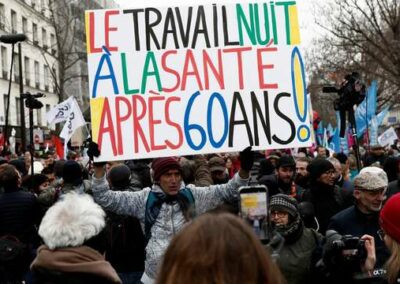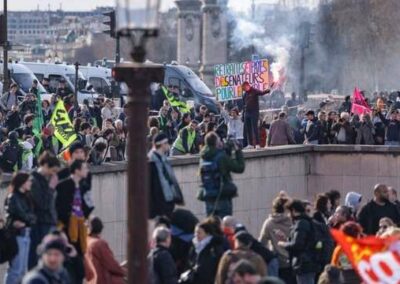Protesters in France are demanding the resignation of Emmanual Macron as the country’s president and Elisabeth Borne as Prime Minister following their role in forcing through the pension reform without a vote.
For the second night in a row, demonstrators lit fires, with some throwing firecrackers at police for trying to disperse them using teargas. The protest began on Thursday after President Macron and Prime Minister Borne bypassed the National Assembly to raise the retirement age from 62 to 64 years.
Barely one week ago (March 11), the Senate voted to approve the increase in the retirement age from 62 to 64 years. Workers were sure that the bill would not survive a vote at the National Assembly but to the surprise of many, the government used article 49:3 to push through the controversial bill amid protests from opposition members of Parliament and joint workers unions in the country.
What the protesters are saying
The protesters are critical of the government’s handling of the reform process, accusing them of not engaging in meaningful dialogue with labour unions and other stakeholders. In response, they have organised nationwide strikes, demonstrations, and other forms of civil disobedience to voice their opposition to the reforms.
Overall, the protesters believe that increasing the retirement age from 62 to 64 will have a significant negative impact on the French workforce and are calling on the government to reconsider the proposed changes and engage in a more collaborative approach to reforming the pension system.
There were protests in the country’s capital of Paris, Bordeaux, Toulon, and Strasbourg.
“Macron, Resign!” the demonstrators chanted, with riot policemen standing on the other side.
Another protester told Reuters News Agency that pushing the reform without a vote was a “denial of democracy” and a total denial of what has been happening in the streets for several weeks.”
“We won’t give up. There’s still hope that the reform can be revoked,” another demonstrator told AFP news agency.”
Laurent Berger, head of the moderate CFDT union, said the goal of the various unions was not to change the government but to withdraw the pension reform immediately.
“Changing the government or prime minister will not put out this fire, only withdrawing the reform,” he said.
Workers’ strike forces Paris into a city of dirt and rats
Although the more than two million people living in Paris are unhappy with the current living conditions due to strikes and demonstrations, the six million rats are having the best moments of their lives.
There is enough refuse for them as refuse collections have joined the pension strikes for about two weeks. This had left enough waste on the city’s streets, and the situation might not get better soon, as the strike might continue until the end of the month. As early as Monday, the Paris authority said about 5,600 tonnes of waste were on the streets, and their collectors were at home.
To make matters worst, three waste treatment sites have been closed, and the fourth is only partially open.
“The strike triggers a change in rat behaviour. They’ll rummage around in bins, reproduce there, and leave their urine and droppings. We have a worrying health risk for refuse collectors and the general population,” specialist Romain Lasseur told Le Parisien newspaper.
Apart from the dirty city, the transportation system, public services, and schools have been affected by the strike. Fuel deliveries are also affected as refineries are on the verge of stopping production.
How Macron is gambling with his government
The survival of the French government depends on the passage of the controversial pension reform bill. How?
Under Article 49:3, the Prime Minister can present a bill to the National Assembly and declare that the adoption of this bill is a matter of confidence. This means that the National Assembly must either adopt the bill or vote no confidence in the government. This provision is also known as “engagement de responsabilité” or “commitment of responsibility.”
If the National Assembly fails to pass a vote of no confidence within 24 hours after the presentation of the bill, the bill is deemed adopted. However, if the National Assembly adopts a vote of no confidence, the government must resign.
Article 49:3 is controversial because it can be seen as limiting the role of the National Assembly in the legislative process and giving the government significant power to pass laws without parliamentary debate.
Already, left-wing and centrist opposition lawmakers have filed a motion of no-confidence in parliament on Friday afternoon. However, it is unlikely that the vote would go in their favour because of the number of lawmakers needed to push it through. Anything could still happen, as the no-confidence vote could happen as early as Monday.
If it succeeds, Macron’s prime minister and cabinet would step aside immediately and the controversial reform would fail. But if it does not, the government remains and the bill becomes a law.
Why risk a government to increase the retirement age by two years?
The French pension system is paid for by employment taxes. That means the system runs with the taxes paid by the workers during their working years. The French government believes if the system continues the way it is, there might not be funds to pay pensions because of the early retirement age. Hence, working two more years would enable workers to pay more employment taxes and in turn make more money available for pension funds. In simple terms, Macon believes France could no longer afford the retirement age of 62.
For the workers and citizens, they want to protect an early retirement age, which is one of the lowest in Europe, hence the massive protest.
Macron does not want anything to stand in the way of the bill. Hence, after a vote by the senate, the government bypassed the lower house of parliament because it would not have sufficient votes to push it through. So rather than vote, Article 49.3 was enforced, allowing him to enact the reform without a vote of parliament.








0 Comments